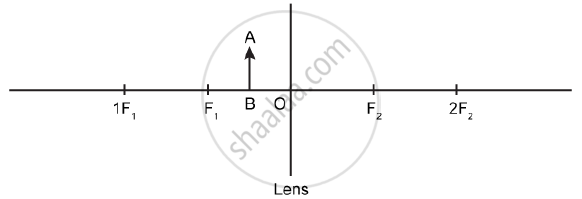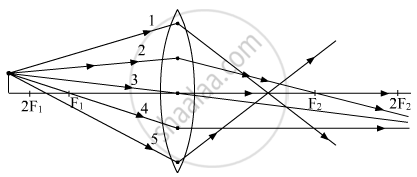Advertisements
Advertisements
प्रश्न
Three convex lenses are available having focal lengths of 4 cm, 40 cm and 4 m respectively. Which one would you choose as a magnifying glass and why?
उत्तर
We will choose the lens with a focal length of 4 cm as the image formed will be more magnified (the smaller the focal length of a lens, the higher will be the magnification).
APPEARS IN
संबंधित प्रश्न
A student places a candle flame at a distance of about 60 cm from a convex lens of focal length 10 cm and focuses the image of the flame on a screen. After that he gradually moves the flame towards the lens and each time focuses the image on the screen.
(a) In which direction-toward or away from the lens, does he move the screen to focus the image?
(b) How does the size of the image change?
(c) How does the intensity of the image change as the flame moves towards the lens?
(d) Approximately for what distance between the flame and the lens, the image formed on the screen is inverted and of the same size?
An object AB is placed between O and F1 on the principal axis of a converging lens as shown in the diagram.

Copy the diagram and by using three standard rays starting from point A, obtain an image of the object AB.
Draw a labelled ray diagram to show how a ray of light is refracted when it passes:
from air into an optically denser medium.
Draw a labelled ray diagram to show how a ray of light passes through a parallel sided glass block:
if it hits the glass block at an angle other than 90° (that is, obliquely to the glass block).
Draw a ray diagram to show the formation of a real magnified image by a convex lens. (In your sketch the position of object and image with respect to the principal focus of lens should be shown clearly).
A convex lens of focal length 8 cm forms a real image of the same size as the object. The distance between object and its image will be:
(a) 8 cm
(b) 16 cm
(c) 24 cm
(d) 32 cm
What kind of lens can form:
am erect diminished image?
A lens forms an upright and magnified image of an object State whether the image is real or virtual
Out of the five incident rays shown in the figure find the three rays that are obeying the laws of refraction and may be used for locating the position of image formed by a convex lens:
(A) 1, 2 and 3
(B) 2, 3 and 4
(C) 3, 4 and 5
(D) 1, 2 and 4
